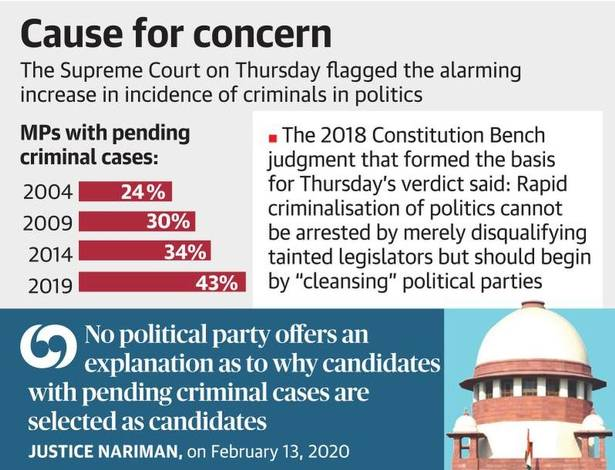Governance
Criminalisation of Politics
This article is based on “Owning up to criminalisation in politics” which was published in The Hindu on 10/07/2020. It talks about the menace of criminalisation of politics in India.
Upcoming Bihar elections in October 2020, will be the first election where the Supreme Court's decision (given in february 2020) that requires political parties to publish the entire criminal history of their candidates for elections along with the reasons to field such suspected criminals, will be implemented.
This judgement also requires such information mandatorily be published in a local and national newspaper as well as the parties’ social media handles.
While the judgment may have far-reaching consequences for curbing criminalisation of politics, yet still a lot has to be done to make a cleaner electoral process in India.
Significance of the Judgment
- This order by the Supreme Court is in line with a series of judgments aimed at preserving the purity of the election process. Some of the judgements are as follows:
- Directions to ensure the asset disclosure and criminal records of candidates.
- The incorporation of the ‘none of the above’ option in the voting machine.
- Invalidation of a clause that protected sitting legislators from immediate disqualification after conviction.
- Establishment of special courts in all States for the quick disposal of cases involving elected representatives.
- The political party and its leadership would for the first time have to publicly own up to criminalisation of politics, which they had been denying it all these years.
- The judgment assumes importance amid the steady deterioration in politics over decades, with the decline accelerating in the last two decades.
- In 2004, 24% of the Members of Parliament had criminal cases pending against them. It shot up to 30% in 2009 and 34% in 2014.
- In 2019 as many as 43% of MPs had criminal cases pending against them.
Reasons of Criminalisation of Politics
Lack of Political Will: Majorly whatever progress made in curbing criminalisation of politics has been through the initiative of the Supreme Court and the Election Commission.
- However, it is parliament's responsibility to amend the Representation of the People (RPA) Act 1951, which deals with disqualification of candidates against whom charges have been proved in court for serious offences.
- In spite of taking appropriate measures to amend the RPA Act, there has been an unsaid understanding among the political parties which deters Parliament to make strong law curbing criminalisation of politics.
Lack of Enforcement: Several laws and court judgments have not helped much, due to the lack of enforcement of laws and judgments. For example, blatant violation of Model Code of Conduct, as seen in almost all elections.
Narrow Self-interests: Publishing of the entire criminal history of candidates fielded by political parties may not be very effective, as a major chunk of voters tend to vote through a narrow prism of community interests like caste or religion.
Use of Muscle and Money Power: Candidates with serious records seem to do well despite their public image, largely due to their ability to finance their own elections and bring substantive resources to their respective parties.
- Also, sometimes voters are left with no options, as all competing candidates have criminal records.
Effect of Criminalisation of Politics
- Against the Principle of Free and Fair Election: Using money and muscle power in elections, limits the choice of voters to elect a suitable candidate.
- Also, it is against the ethos of free and fair election which is the bedrock of a democracy.
- Affecting Good Governance: The major problem is that the law-breakers become law-makers, this affects the efficacy of the democratic process in delivering good governance.
- These unhealthy tendencies in the democratic system reflect a poor image of the nature of India’s state institutions and the quality of its elected representatives.
- Affecting Integrity of Public Servants: It also leads to increased circulation of black money during and after elections, which in turn increases corruption in society and affects the working of public servants.
- Causes Social Disharmony: It introduces a culture of violence in society and sets a bad precedent for the youth to follow and reduces people 's faith in democracy as a system of governance.
Way Forward
State Funding of Election: Various committees (Dinesh Goswami, Inderjeet Committee) on the electoral reforms have recommended for state funding of elections.
- State funding of elections will curb use of black money to a large extent and thereby will have a significant impact on limiting criminalization of politics.
Strengthening of Election Commission: Election Commission can register a political party but cannot deregister it. Regulating the affairs of a political party is essential for a cleaner electoral process.
- Therefore, it is imperative to strengthen the election commission.
Behavioural Change: Until the citizens realise that people who bribe them for votes cannot be trusted and it will be to their ultimate disadvantage, the efforts to curb criminalisation of politics will have limited impact.
- Thus, voters also need to be vigilant about misuse of money, gifts and other inducements during elections.
- Further, seeing a behavioral change amongst voters, political parties will be forced to field candidates with a clean background.
Conclusion
Given the reluctance by the political parties to curb criminalisation of politics and its growing detrimental effects on Indian democracy, Indian courts must now seriously consider banning people accused with serious criminal charges from contesting elections.
While there are various arguments for and against such a move, it will be a step in the right direction for making Indian elections more free and fair.
|
Drishti Mains Question De-criminalisation of politics cannot be achieved by judicial fiat alone, it requires strong political will and most importantly a behavioral change amongst the Indian voters. Comment. |





